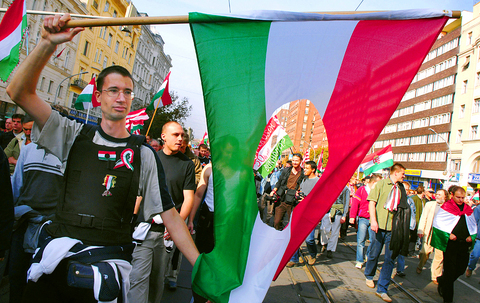Police in Budapest expelled several hundred protesters early yesterday from a square outside parliament as Hungary commemorated the 50th anniversary of its anti-Soviet uprising.
Protests on Kossuth Square started on Sept. 17, when a recording was leaked revealing Socialist Prime Minister Ferenc Gyurcsany admitting that the government had lied about the economy before its re-election in April. The protesters had vowed to stay until Gyurcsany was dismissed, but police pushed them off the square after they refused to submit to checks.
But authorities did not dismantle the dozens of tents set up by the protesters, and were expected to allow the demonstrators to return after yesterday's official events.

PHOTO: AP
As the commemoration events began, reporters from state news wire MTI said police had beaten some of the protesters -- including women and elderly people -- with rubber batons, leaving several with head injuries.
President Laszlo Solyom on Sunday issued a plea for national unity, trying to keep the bitter political divisions from spilling over into the celebrations.
"Oct. 23 could be a real national holiday if we wanted it to be and if we took the steps leading back to the unity and uniqueness of 1956," Solyom said at a gala event at the Hungarian State Opera which launched the official ceremonies.
Commemorations began yesterday with a ceremonial raising of the national flag, followed by Hungarian and foreign dignitaries laying flowers at the foot of a 1956 monument on Kossuth Square.
Officials later attended a special session in the legislature's Upper House Chamber, where Gyurcsany and European Commission President Jose Manuel Barroso spoke.
"Our debates on 1956 are not about the past, but the present. About who we are, what kind of world we would like," Gyurcsany said. "1956 is just a reminder, a mirror in which we see our present selves."
He described Imre Nagy, the communist-turned-democrat who was briefly returned to power in 1956, as "the political predecessor of every prime minister" of post-communist Hungary.
Barroso said the 1956 revolution "lit a torch of freedom" which later helped topple dictatorships across Europe.
"The courage of the -- often anonymous -- heroes of 1956 led to the foundation of new democracies and the reunification of Europe," Barroso said.
Delegations from at least 56 countries were in Budapest for the ceremonies, including NATO Secretary-General Jaap de Hoop Scheffer and Spain's King Juan Carlos.

Authorities have detained three former Taiwan Semiconductor Manufacturing Co (TMSC, 台積電) employees on suspicion of compromising classified technology used in making 2-nanometer chips, the Taiwan High Prosecutors’ Office said yesterday. Prosecutors are holding a former TSMC engineer surnamed Chen (陳) and two recently sacked TSMC engineers, including one person surnamed Wu (吳) in detention with restricted communication, following an investigation launched on July 25, a statement said. The announcement came a day after Nikkei Asia reported on the technology theft in an exclusive story, saying TSMC had fired two workers for contravening data rules on advanced chipmaking technology. Two-nanometer wafers are the most

Tsunami waves were possible in three areas of Kamchatka in Russia’s Far East, the Russian Ministry for Emergency Services said yesterday after a magnitude 7.0 earthquake hit the nearby Kuril Islands. “The expected wave heights are low, but you must still move away from the shore,” the ministry said on the Telegram messaging app, after the latest seismic activity in the area. However, the Pacific Tsunami Warning System in Hawaii said there was no tsunami warning after the quake. The Russian tsunami alert was later canceled. Overnight, the Krasheninnikov volcano in Kamchatka erupted for the first time in 600 years, Russia’s RIA

CHINA’s BULLYING: The former British prime minister said that he believes ‘Taiwan can and will’ protect its freedom and democracy, as its people are lovers of liberty Former British prime minister Boris Johnson yesterday said Western nations should have the courage to stand with and deepen their economic partnerships with Taiwan in the face of China’s intensified pressure. He made the remarks at the ninth Ketagalan Forum: 2025 Indo-Pacific Security Dialogue hosted by the Ministry of Foreign Affairs and the Prospect Foundation in Taipei. Johnson, who is visiting Taiwan for the first time, said he had seen Taiwan’s coastline on a screen on his indoor bicycle, but wanted to learn more about the nation, including its artificial intelligence (AI) development, the key technology of the 21st century. Calling himself an

South Korea yesterday said that it was removing loudspeakers used to blare K-pop and news reports to North Korea, as the new administration in Seoul tries to ease tensions with its bellicose neighbor. The nations, still technically at war, had already halted propaganda broadcasts along the demilitarized zone, Seoul’s military said in June after the election of South Korean President Lee Jae-myung. It said in June that Pyongyang stopped transmitting bizarre, unsettling noises along the border that had become a major nuisance for South Korean residents, a day after South Korea’s loudspeakers fell silent. “Starting today, the military has begun removing the loudspeakers,”